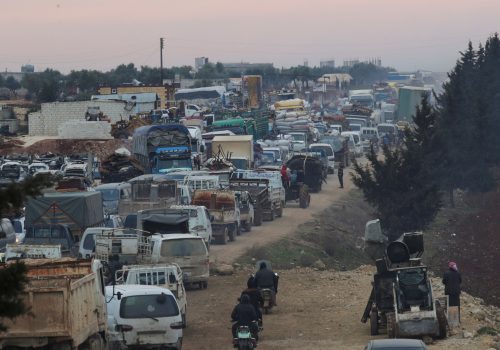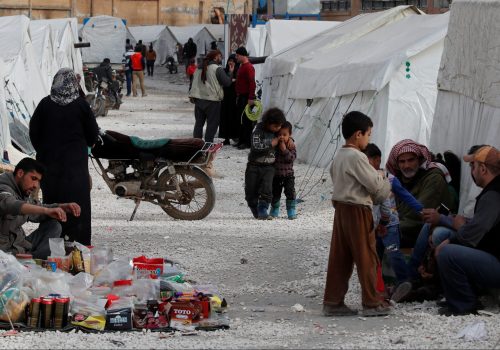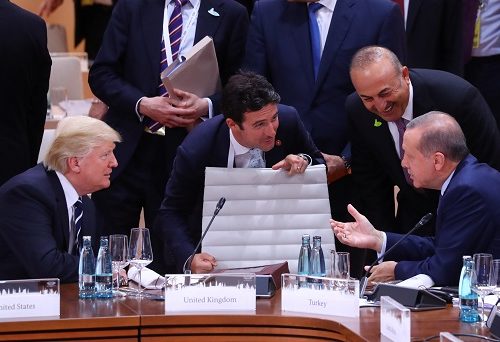Pseudo diplomacy in Syria
If anything at all has been learned from nine years of geopolitical and humanitarian catastrophe in Syria it is this: In dealing with adversaries devoid of human values and basking in impunity, diplomacy unbacked by the credible threat of military force is not really diplomacy; rather it is a useless exercise in wordsmithing, one shuttling between naivete and cynicism. It is pseudo diplomacy. Current events in northwestern Syria drive home the point.
Turkey and Russia have reached a ceasefire agreement that may slow, for a time, the slaughter of Syrian civilians and Moscow’s program of detaching Turkey from NATO. Yet the Bashar al-Assad regime is permitted, under its terms, to keep the territory it has gained through Russian-abetted state terror. There is no possibility that the million Syrians uprooted by a deliberate program of civilian homicide will return home to live in peace, and it is only a matter of time before the regime, Russia, and Iran move to finish the job in Idlib province.
Finishing the job in northwestern Syria would either push millions more refugees into Turkey or permit Assad’s forces, their Iranian-led foreign fighter allies, and Russia to do their worst to terrified civilians jammed along the northern border and blocked from entering Turkey. Either way, a job completed could enable Russia’s Vladimir Putin to claim a stunning dual victory over a supine West: Enabling an otherwise hapless client to murder his way all the way to the Turkish border; and fully alienating Turkey from NATO allies whose only real interest in Syrian refugees is keeping them out of Western Europe.
Relatively early in this crisis Syrian President Assad took a stunning risk by assessing as empty President Barack Obama’s 2012 “red line” warning about using chemical weapons. No doubt Assad was already encouraged by the vacuity of Obama’s 2011 call on him to step aside. And as he cautiously unleashed low-level chemical assaults on civilians through mid-2013, Assad must have felt triumphantly justified. But the attack of August 21, 2013 was simply too big and too public to be swept under the rug in Washington. This was the moment of truth.
Contrary to the counsel of his senior advisors, Obama allowed a reckless bluff to be called. Moscow—perhaps alarmed by the seemingly high risk of Syria deciding to face down the United States—obliged its client to permit the removal of most (though not, as formally agreed, all) of its chemical weaponry and capabilities. But what the Kremlin saw in 2013 Syria was not forgotten in its 2014 seizure of Crimea, its 2015 military intervention in Syria, and its 2016 meddling in American electoral politics. Putin knew the pseudo diplomacy of his principal adversary was a leverage-free copy of the real thing; a conclusion confirmed by the frenetic and useless efforts of Secretary of State John Kerry to counter Russia’s military intervention in Syria by loudly demanding that an incredulous Assad engage in peace talks and political compromise.
The Trump administration initially slowed this dangerous, globally destabilizing charade by twice retaliating militarily for Assad chemical attacks and by effectively repelling a Russian mercenary-led ground assault in northeastern Syria. But Assad quickly concluded he was free to do mass murder where and when he pleased, so long as he did it without certain kinds of chemicals. And Russian pilots honed their skills in hitting hospitals, schools, mosques, and market places.
Ankara, meanwhile, concluded that the Syria policy of the United States combined an alliance with a Kurdish enemy in the northeast with operational indifference to regime and Russian atrocities in the northwest. This—in addition to Western Europe viewing Turkey as its container and overflow bin for Syrian refugees—gave Putin an opportunity to show Turkish President Recep Tayyip Erdogan an alternate geopolitical route, one leading directly to the Kremlin. Assessing Russian diplomacy (in contrast to that of the West) as real, Erdogan took the bait. Putin now has the difficult task of promoting Assad militarily while separating Turkey from NATO. He may be excused for hoping Western passivity will be the most effective tool in his kit as he seeks to do the seemingly impossible.
Washington does not lack for talented diplomats as it tries to support Turkey in northwestern Syria. What it seems to lack, however, is real diplomacy. Instead it relies on talking points devoid of any credible threat of military force.
Ideally Washington would be encouraging Ankara to plan a ground campaign to clear Assad’s forces and Iranian-led foreign fighters from much of Syria’s northwest to positions that can be defended militarily. The plan would be implemented quickly after the regime violates the current ceasefire. The desired result would be a protected zone large enough to allow recently displaced Syrian civilians safely to return home. Once the protected zone is established, al-Qaeda-related elements can, to the delight of Syrian civilians, be identified and neutralized.
Ankara would not undertake such an operation without adequate air defense for its ground forces. This is where a serious private warning from Washington to Moscow would be in order, something along the following lines: “If your client violates the ceasefire, we will support Turkey’s efforts to rectify the matter militarily. We would not hesitate, using our own assets, to engage and destroy your client’s air forces and air defenses. And if Turkish ground forces come under air attack from any quarter, we will assist Turkey in countering that threat. We would hope to uphold bilateral deconfliction procedures we have long agreed upon. But that would be up to you.”
Perhaps such a quiet message has already been delivered. But at least three times senior American officials have publicly gutted American diplomacy by declaring military measures to be off the table.
The administration’s capable point-man on Syria—Ambassador James Jeffrey—has said that the specifics of American support for Turkey are now under discussion with Ankara. But when asked by a reporter to specify the sources of American diplomatic leverage in the Syrian crisis, he signaled what amounts to a continuation of the time-honored approach: “But our main effort in terms of what tools we have to try to push for a negotiated settlement are economic and diplomatic. It is the isolation of the evil Assad regime and it is our sanctions policy and a denial of reconstruction assistance to keep this—to keep the pressure on the regime and on the regime’s supporters, Russia and Iran, to come to a compromise result.” These tools have long-term uses, but not for the task of applying a tourniquet to the gushing arterial wound that is Idlib.
As Ambassador Tom Fletcher observes in The Naked Diplomat, “The history of diplomacy suggests that diplomats have always been the most effective when they have understood, channeled and represented real power . . . If diplomats are not where the power is, they are simply slow journalists with smaller audiences.”
For nine years the West has chosen, in the context of Syria, to deny real power to its diplomats and its diplomacy. It has preemptively conceded escalatory dominance to Russia and even to the Assad regime. It has hoped against hope that Syria’s suffering would stay inside Syria, and it has lulled itself into stupor with useless communiques condemning “in the strongest possible terms” ongoing crimes against humanity and reciting the mantra about there being “no military solution” for Syria. Russia has seen abject weakness and has exploited it far beyond Syria. This will continue unless the West decides to adopt diplomatic practices appropriate to countering adversaries feeling no limits to their violent, criminal depredations. Yes, even interventions far short of invasion and occupation pose risks. Will anyone still argue that preemptive passivity and pseudo diplomacy do not?
Ambassador Frederic C. Hof is Bard College’s Diplomat in Residence and a distinguished Senior Fellow at the Atlantic Council.
Image: Russian President Vladimir Putin meets his Turkish counterpart, Recep Tayyip Erdogan in Moscow, Russia, on March 5, 2020 (Reuters)


